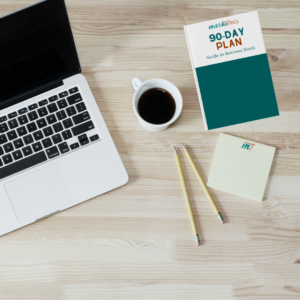In this article series, we’re giving you all our best advice to make your plans a success. Because we know everybody is unique in their approach to goals & planning, we’ve asked each of our team members to share what works (& what doesn’t) for them. Here our Digital Marketing Architect Hope H. is giving you her candid advice.
Here’s a recap of what our team members have to say:
- Planning for Success: A Guide to Achieving Goals
- The Foundation of a Great Plan: Your Goal! Plan Like a Pro.
Here’s what you can expect to learn today:
- Which of the 6 types of goal setters are you?
- If you struggle with planning, read this…
- How planning eliminates overwhelm & procrastination
- Why I embrace a flexible, realistic planning style
- My best advice to guide you
- Plus, Get your FREE 90-Day Planning Guide!
What is Your Goal Setting Style?
When it comes to goal-setting, which of the 6 types are you (as identified by Gallup)?
- I wing it. Sure I’ll stay focused, but I don’t write them down or plan out steps.
- I’m diligent. I do write my goals down and plan steps.
- I memorize. Although I plan steps, I don’t write my goals down.
- I’m a generalist. I write my goals down, but don’t specifically plan steps.
- Inattentive is my approach: I set goals, but I don’t focus on them through the year.
- Goals? I don’t set ‘em.
Unless you’re not into setting goals at all, there is one simple, proven approach that can help you achieve them more easily (and effectively): Planning.
Struggle with Planning? Here’s Why you Should Still Give it a Try
If you’re the type of person who finds planning boring and restrictive, I can totally relate because I tend to struggle with planning myself.
I prefer to work spontaneously and creatively, but that has often led me to procrastinate and rush things at the last minute. I’ve realized that this is not a sustainable or effective way to work, and it was affecting my performance and well-being.
So, I decided to give planning a try – like for real – and I was surprised by how much it has helped me. Planning has helped me to avoid last-minute stress and deliver quality work on time. It enabled me to identify what, when, and how to do things effectively.
Decrease Overwhelm & Reach Your Goals
Through planning, I’ve learned how to:
- Prioritize work items
- Manage my time better
- Cope with uncertainty
Before I started planning, I was often overwhelmed by the amount of work I had to do and the deadlines I had to meet. I didn’t know where to start – or how to finish. It resulted in wasting a lot of time on unimportant/easy tasks, while postponing the important/difficult ones.
I was also stressed out by the unexpected changes or challenges that came up along the way. It felt like I had no control over my work or my life. Through planning, I’ve learned how to prioritize my tasks based on their urgency and importance. I’ve learned how to allocate my time and resources more effectively, and how to set realistic and achievable goals.
Why I Love a Flexible, Realistic Planning Style
My planning style is flexible, realistic, and adaptable. It’s difficult for me to follow rigid or detailed plans that leave no room for creativity or spontaneity.
I prefer to have a general outline of what I want to achieve and how I want to achieve it, but I also allow myself some freedom and flexibility to adjust to the situation.
I try to be realistic about what I can accomplish in a given time frame, and I don’t set myself up for failure by setting unrealistic or impossible goals.
My Top Planning Advice For You
My best planning advice is to break down big tasks into smaller chunks and set mini-deadlines for each one. This is something that has helped me a lot with overcoming procrastination and getting things done.
When I face a big task, I often feel overwhelmed and intimidated by the amount of work and time involved. I tend to avoid or delay starting the task, hoping that it will go away or become easier somehow. But this only makes the task more daunting and stressful as the deadline approaches. By breaking down the big task into smaller chunks, I make it more manageable.
Some tools that help me with planning are:
- Hard-copy planners
- The “structured” planning app
- Calendar/phone alarms
Why You Need Our 90 Day Planning Guide
Since planning can help you avoid procrastination and reduce or eliminate overwhelm, why wouldn’t you want to try it?
We designed our Marketecs free 90 Day Planning Guide to help you plan your goals like a pro! It’s a straightforward tool to help you conquer more in the next 90 days than ever before.
Start planning achievable goals for the next 90 days today. Your complimentary Guide is right here.


